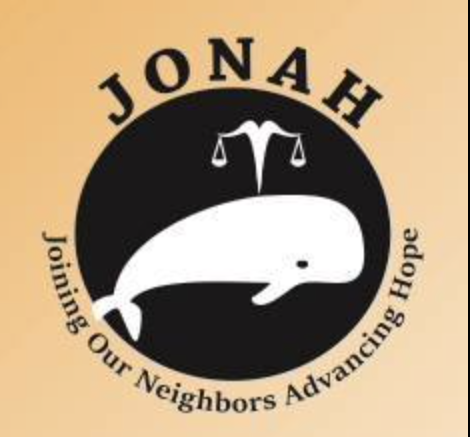By Kari Allen
About the Conference
On Saturday, October 21, a group of small town and rural leaders met for JONAH’s first Community Conference for Small Towns in the Chippewa Valley and beyond. Often, resources are spread thin in rural areas, and holding this conference in a small town like Stanley was designed to make learning about community organizing more accessible. Attendees were encouraged to come with their own unique contexts in mind, so that the group could collectively consider how to support any concerns specific to small towns and their local leaders.
The group of attendees encompassed a wide variety of backgrounds. From Cornell to Chippewa Falls, to Galesville and even Rushford MN, small town leaders traveled from near and far to Our Savior’s Lutheran Church in Stanley, WI. Ages 21-75, a majority women, and all passionate about caring for their neighbors who are struggling, this group spent the day learning from various non-profits, advocates, and experienced leaders. In order to provide tools for effective change, JONAH provided training opportunities, like Intro to Organizing, How to Have One-on-ones, and built-in time for intentional relationship building. The group heard from two separate story-sharing panels: one with local community leaders and another with people directly-impacted by mental health and substance misuse. Attendees were also able to choose from several workshop opportunities:
- Digital Equity as an Organizing Tool
- Myths vs. Realities of Latin American Culture
- Goodwill’s Restorative Justice program
- FREE: How Incarceration Impacts Women
- Gamaliel’s Issues and Actions training
Content was planned based on JONAH’s Rural Outreach project survey data and conversations, which indicated rural interest in topics like substance misuse, mental health, and broadband.
It was a busy day with so many conversations, connections, and much worthwhile contemplation. At the conclusion of the day, attendees were asked to reflect on their next steps. Outcomes included staying connected, seeking more JONAH training presentations, sharing what they learned, and 63% of those who completed the evaluation reported they were likely to pursue local leadership.
A Reflection from the Rural Organizer
Some of the feedback we received referred to hopes for a higher turnout. Initially, it is easy to be discouraged by low turnout numbers. Invitations were sent far and wide, and the event planners utilized a variety of advertising methods, but we did not reach our goal of 50 registered attendees. However, it would be a mistake to say that low turnout indicates a failure or a negative experience. In fact, 90% of those who completed evaluations rated the day 5/5, and 100% said they made helpful connections with others. This conference was a valuable experience for those who had the courage and compassion to show up for their communities. Taking action can sometimes feel scary or uncomfortable. Putting ourselves out there and genuinely trying to make inclusive and justice-minded change in our communities is challenging. The reality is that our neighbors here in western Wisconsin do need help; my hope is that we show up for them even when it’s hard.
One of the most surprising aspects for me was how some folks drove over two hours to be there. While our group was small, we had a very wide reach. Part of the challenge for rural and small town areas is the long distance people need to travel to have access to resources typically found in larger towns and cities. The willingness to travel so far to this event may indicate how rare rural-specific leadership and support is to find. While we intentionally planned for a small town location and an in-person gathering for the sake of high-quality relationship building, it would be worth considering alternatives like virtual gatherings or trainings to have an even further reach for those who are unable to drive multiple hours. Although, with inconsistent rural access to broadband internet, a virtual gathering could exclude the very audience we hope to include. This conversation is ongoing, and JONAH will continue to learn about and dedicate intentional consideration towards equitable rural inclusion and access.
Throughout this past 14 months of JONAH’s Rural Outreach project, small town neighbors who want to work together for a positive community have shared that it can feel isolating, especially when there aren’t the right tools or resources closeby for the things they would like to see in their towns. Creating this space as an opportunity for connection was a proud step towards furthering JONAH’s rural inclusion and nurturing small town leaders in their own settings. The seeds have been planted; now we watch them grow.

